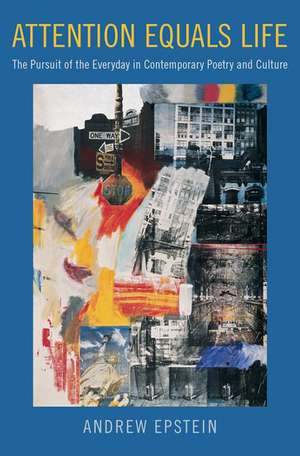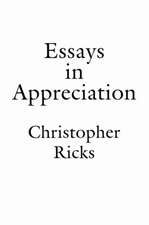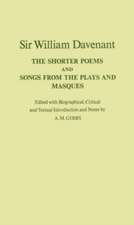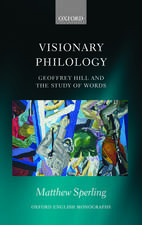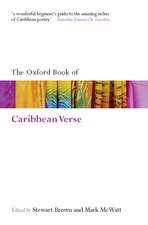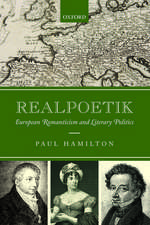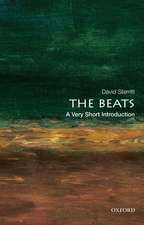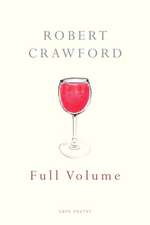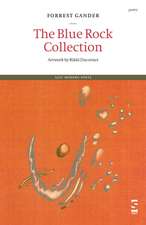Attention Equals Life: The Pursuit of the Everyday in Contemporary Poetry and Culture
Autor Andrew Epsteinen Limba Engleză Hardback – 4 aug 2016
| Toate formatele și edițiile | Preț | Express |
|---|---|---|
| Paperback (1) | 252.90 lei 31-37 zile | |
| Oxford University Press – 4 oct 2018 | 252.90 lei 31-37 zile | |
| Hardback (1) | 617.73 lei 31-37 zile | |
| Oxford University Press – 4 aug 2016 | 617.73 lei 31-37 zile |
Preț: 617.73 lei
Preț vechi: 708.71 lei
-13% Nou
Puncte Express: 927
Preț estimativ în valută:
118.20€ • 123.41$ • 97.83£
118.20€ • 123.41$ • 97.83£
Carte tipărită la comandă
Livrare economică 25-31 martie
Preluare comenzi: 021 569.72.76
Specificații
ISBN-13: 9780199972128
ISBN-10: 0199972125
Pagini: 380
Dimensiuni: 234 x 155 x 36 mm
Greutate: 0.78 kg
Editura: Oxford University Press
Colecția OUP USA
Locul publicării:New York, United States
ISBN-10: 0199972125
Pagini: 380
Dimensiuni: 234 x 155 x 36 mm
Greutate: 0.78 kg
Editura: Oxford University Press
Colecția OUP USA
Locul publicării:New York, United States
Recenzii
Andrew Epstein's Attention Equals Life: The Pursuit of the Everyday in Contemporary Poetry and Culture is perhaps the most dazzling work on American poetry this year and can justly be read as the culmination of several years of work on American poetry and the everyday ...Epstein's work is, quite genuinely, the culmination of this fine red thread of scholarly work. [The first two chapters] summarize and clarify work on poetics and the everyday decisively. Readers seeking a complete and concise overview of the state of the field should turn to these two chapters as well for a rehearsal of the increasing use of Henri Lefebvre in contemporary literary studies and the leveraging of his form of Marxism in tension with French theory and the Situationists ... Epstein's nuanced close readings, critical acumen in theorizations of the everyday, and fluid movement through diverse poetic visions are deeply impressive.
Andrew Epstein's Attention Equals Life: The Pursuit of the Everyday in Contemporary Poetry and Culture is a sharply focused contribution to the field of everyday life studies that underscores the rhetorical stakes of daily life and the role of poetry to channel attention in an age of distraction.
Attention Equals Life contributes meaningfully to a growing body of critical work on avant-garde literary conceptualism and its precursors and will be of interest to a wide range of readers with and without specifically academic interests in contemporary poetry; the book is accessibly written and makes a propitious introduction to twentieth-century theories and poetries of everyday life. Like the extravagantly inclusive long poems Epstein favors in his study, poems that awaken us to the elusive textures of habitual experience, Attention Equals Life will awaken its audience to the exhilarating formal experiments that the everyday, fraught with inexhaustible paradoxes, has lately inspired.
It's no wonder that a scholar who has written extensively on the poetry of friendship produces such generous close readings of individual poems. But the greater significance of this book lies in the exhaustive argument it provides for why everydayness has become the driving concern of post-1945 poetry, an argument that brings him into fruitful contact with the depths of the Frankfurt school and the so-called shallows of our digital episteme.
Attention Equals Life is an exemplary work of criticism. Authoritative but not dogmatic, at once wide-ranging and immersed in the textual details of individual poems, it provides in each chapter both a conceptual map for understanding broad cultural and aesthetic trends and the sort of sensitive and synthetic account of a poet's career that will stand as the starting point for future scholars and students. It is certain to become one of the definitive literary histories of postwar and contemporary American poetry.
Epstein's Attention Equals Life (2016) offers a powerful account of the preoccupation with the everyday and the construction of what he calls a "skeptical realism" in postwar US poetry. ... Epstein's argument is not only original but persuasive too. It has that quality that only the best arguments do of cutting through an already well-plowed field in order to reveal similarities and affinities between otherwise aesthetically disparate materials.
Epsteins expansive scope stretches from the psychological formulations of William James, to the cinematic essays of Jean-Luc Godard and Agnès Varda, to contemporary everyday-life poetic experiments by Brenda Coultas, Claudia Rankine, and Harryette Mullen. Perhaps most importantly, Attention Equals Life offers the galvanizing example of an omnivorous yet meticulous scholarly study that poses direct questions to readers about how best to live out ones own everyday.
Epsteins study clears a path to the recent past that helps us understand why genre- and syntax-busting techniques are now much more visible in American poetry. The ordinary is as wild and provocative as ever.
Attention Equals Life is the culmination of work from the past several years on modernism and the everyday, particularly American poetry moving toward the mid-century. The book is extremely readable for broad audiences and makes a compelling extension of discussions of the everyday, both from an American standpoint and with a focus on mid-century literary production ... This study challenges our perception of poetry as a genre and as a form it raises new questions in terms of poetics, aesthetics, and ethics, and particularly how poetry works as a form of cultural and political action. Attention Equals Life is a completely convincing work.
The erudition Epstein brings to Attention Equals Life makes the book a worthwhile, if sometimes complicated, read. It provides an introduction to a number of contemporary poets and poetic schools. The fact that this reader disagrees with the author's basic premise does not preclude an enthusiastic recommendation to anyone interested in placing poetry since 1945 in a broader philosophical and aesthetic context.
Attention Equals Life is a significant contribution to the study of how this modern contradiction continues to play out in contemporary culture, and offers a clear way of talking about how a "redistribution of the sensible" might be achieved through a recognition of the inherently mediated nature of perception. In seeking to situate its subject within the widest possible context, though, it offers a choice to the reader, between attending to what unites a disparate set of poets, and focusing on particular work and ideas to the exclusion of others.
A book of enormous breadth and ambition, Attention Equals Life is at once astonishing and reaffirming, challenging and clarifying. It engages more broadly than its scholarly focus would suggest ... This book has something for everyone -- poets, critics, teachers of literature and contemporary culture, fans of contemporary poetry, and even those who think that no poetry of value has emerged in the US since Robert Frost.
Andrew Epstein's Attention Equals Life: The Pursuit of the Everyday in Contemporary Poetry and Culture is a sharply focused contribution to the field of everyday life studies that underscores the rhetorical stakes of daily life and the role of poetry to channel attention in an age of distraction.
Attention Equals Life contributes meaningfully to a growing body of critical work on avant-garde literary conceptualism and its precursors and will be of interest to a wide range of readers with and without specifically academic interests in contemporary poetry; the book is accessibly written and makes a propitious introduction to twentieth-century theories and poetries of everyday life. Like the extravagantly inclusive long poems Epstein favors in his study, poems that awaken us to the elusive textures of habitual experience, Attention Equals Life will awaken its audience to the exhilarating formal experiments that the everyday, fraught with inexhaustible paradoxes, has lately inspired.
It's no wonder that a scholar who has written extensively on the poetry of friendship produces such generous close readings of individual poems. But the greater significance of this book lies in the exhaustive argument it provides for why everydayness has become the driving concern of post-1945 poetry, an argument that brings him into fruitful contact with the depths of the Frankfurt school and the so-called shallows of our digital episteme.
Attention Equals Life is an exemplary work of criticism. Authoritative but not dogmatic, at once wide-ranging and immersed in the textual details of individual poems, it provides in each chapter both a conceptual map for understanding broad cultural and aesthetic trends and the sort of sensitive and synthetic account of a poet's career that will stand as the starting point for future scholars and students. It is certain to become one of the definitive literary histories of postwar and contemporary American poetry.
Epstein's Attention Equals Life (2016) offers a powerful account of the preoccupation with the everyday and the construction of what he calls a "skeptical realism" in postwar US poetry. ... Epstein's argument is not only original but persuasive too. It has that quality that only the best arguments do of cutting through an already well-plowed field in order to reveal similarities and affinities between otherwise aesthetically disparate materials.
Epsteins expansive scope stretches from the psychological formulations of William James, to the cinematic essays of Jean-Luc Godard and Agnès Varda, to contemporary everyday-life poetic experiments by Brenda Coultas, Claudia Rankine, and Harryette Mullen. Perhaps most importantly, Attention Equals Life offers the galvanizing example of an omnivorous yet meticulous scholarly study that poses direct questions to readers about how best to live out ones own everyday.
Epsteins study clears a path to the recent past that helps us understand why genre- and syntax-busting techniques are now much more visible in American poetry. The ordinary is as wild and provocative as ever.
Attention Equals Life is the culmination of work from the past several years on modernism and the everyday, particularly American poetry moving toward the mid-century. The book is extremely readable for broad audiences and makes a compelling extension of discussions of the everyday, both from an American standpoint and with a focus on mid-century literary production ... This study challenges our perception of poetry as a genre and as a form it raises new questions in terms of poetics, aesthetics, and ethics, and particularly how poetry works as a form of cultural and political action. Attention Equals Life is a completely convincing work.
The erudition Epstein brings to Attention Equals Life makes the book a worthwhile, if sometimes complicated, read. It provides an introduction to a number of contemporary poets and poetic schools. The fact that this reader disagrees with the author's basic premise does not preclude an enthusiastic recommendation to anyone interested in placing poetry since 1945 in a broader philosophical and aesthetic context.
Attention Equals Life is a significant contribution to the study of how this modern contradiction continues to play out in contemporary culture, and offers a clear way of talking about how a "redistribution of the sensible" might be achieved through a recognition of the inherently mediated nature of perception. In seeking to situate its subject within the widest possible context, though, it offers a choice to the reader, between attending to what unites a disparate set of poets, and focusing on particular work and ideas to the exclusion of others.
A book of enormous breadth and ambition, Attention Equals Life is at once astonishing and reaffirming, challenging and clarifying. It engages more broadly than its scholarly focus would suggest ... This book has something for everyone -- poets, critics, teachers of literature and contemporary culture, fans of contemporary poetry, and even those who think that no poetry of value has emerged in the US since Robert Frost.
Notă biografică
Andrew Epstein is an Associate Professor in the English Department at Florida State University. He is the author of Beautiful Enemies: Friendship and Postwar American Poetry.
